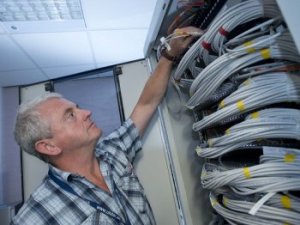Aug 12 2013
The fastest trans-Atlantic research laboratory communications connection anywhere in Europe is to be installed at the University of Ulster’s School of Computing and Information Engineering at the Coleraine campus.
 Professor Gerard Parr
Professor Gerard Parr
Ulster’s Computer Science Research Institute has secured over £1 million for the three year project which is part funded by Invest Northern Ireland’s Research and Development Fund. When fully operational, the ‘Digital Innovation Infrastructure for Next Generation Internet’ project will provide the Coleraine campus with the fastest laboratory communications network access of its kind between Europe and Northern America via the Kelvin trans-Atlantic fibre.
Project Coordinator Professor Gerard Parr, Chair in Telecommunications Engineering at Coleraine, said it was significant project, not only for the University but for Northern Ireland.
“Project Kelvin, which is operated by Hibernia Networks, currently provides the fastest connection between Europe and North America. We are strategically positioned to leverage the existence of Project Kelvin and we intend to take advantage of the low latency (high speed) connectivity it affords.
“The Cable Landing Station is physically adjacent to the Coleraine campus and we will have a direct high-speed connection from the landing station to a specially designated laboratory on campus.”
The new project, which is part of a strategic research and development initiative, will give the University of Ulster and Northern Ireland a competitive edge for internationally leading industrially relevant research for Cloud Technologies and Massive Data Analytics.
Professor Parr explained: “Project Kelvin provides the high-speed that many companies require to service customers where every second counts. This is a very strong pull factor for global ICT and data centre companies interested in investing in Europe. It is also attractive for companies wishing to conduct innovative research and we hope to benefit from this.
“This project will leverage our existing expertise and resources and we will use it to design and test protocols that will feed into potential standards to manage and monitor the performance of future high capacity storage/compute cloud infrastructure that deal with vast amounts of real-time data.
Professor Parr said the potential of the high speed trans-Atlantic telecommunications fibre connection for academic research could not be overestimated.
“It will be of direct relevance to the ICT industry, PhD training and new collaborative initiatives and could see Northern Ireland become established as a global centre for Cloud Computing technologies with tremendous opportunities for applying our cloud-related research for the aerospace, pharmaceutical, spatial, government, supply chain, financial and creative media sectors, both nationally and internationally.
The Information and Communications Engineering (ICE) Research Group at Ulster has an enviable international reputation for research excellence in areas such as Smart Cities, Cloud Computing, Big Data Analytics, Image Processing for crop disease, medical and security applications.
The ICE group also conducts a range of research projects relating to mathematical modelling and resource performance monitoring for high-speed telecommunications systems.
“We are already attracting interest from overseas research labs and we have a number of very exciting collaborative projects in pipeline that will raise our international profile. My colleagues, Professor Bryan Scotney, Dr Philip Morrow, Professor Sally McClean and Dr Adrian Moore and I wish to applaud and acknowledge the funding received from InvestNI to support this unique initiative.”
The Coleraine based academic said having the Digital Innovation Infrastructure project would underpin their existing research connectively and support the future research strategy of the Computer Science Research Institute at the University.
“It will also encourage new partnerships to be formed with national and international research laboratories and industrial partners who want to develop cutting edge solutions for big data analytics and the design and evaluation of future scalable cloud computing technologies and protocols.”
He added: “In particular, the new project will directly contribute to the UK Government’s ‘Information Economy Strategy and link directly to the UK Government’s ‘Eight Great Technologies’ which was launched by Minister David Willetts earlier this year”. Professor Parr was actually invited to feed into the development of the Government’s Information Economy Strategy earlier this year.
Much of the work underway at Ulster is funded from highly competitive external sources such as the Prestigious Engineering and Physical Research Council (EPSRC) ICT Theme, RCUK Digital Economy Theme, European Commission and from Industry.
Current projects include the EPSRC-DST India-UK Advanced Technology Centre, EPSRC Multidisciplinary Assessment of Technology Centre for Health, EU SAVASA: Standards based approach to video archive search and analysis, RCUK ‘IT as a Utility’ and numerous PhD projects sponsored by DEL, DARD, the University and companies such as BT.
Other initiatives at the University’s Computer Science Research Institute are linked to major activities under development with Japan, USA, UAE, Europe and China concerning topics such as Internet of Things, Wireless Sensor Networks for Smart Cities, Health & Well Being and Software for Managing Cloud Systems.
Welcoming the InvestNI funding, Professor Hugh McKenna, Pro-Vice Chancellor for Research and Innovation at Ulster said: “This is one of five University initiatives that InvestNI has funded this year.
“It has emerged from a ‘perfect storm’ where the University, Government and industry partners came together to highlight that fact that answers were required to the big technological issues of relevance to wider society and the economy.
“Within the University’s Information and Communications Engineering (ICE) Research Group we have the human and physical resources required to provide such answers, and with the EPSRC and Invest Northern Ireland on board, we have the financial resources to undertake research of the highest quality.”
Bjarni Thorvardarson, CEO of Hibernia Networks commented: “Hibernia Networks, as a leader in advanced networking technologies, always strives to push next-generation deployments throughout the globe. We understand that by enabling high tech and high capacity networks, communities and economies will grow and thrive.
“Northern Ireland is very dear to our hearts and we have worked for years in expanding our diverse network routes throughout the region to push innovation and opportunities for businesses of all sizes.”